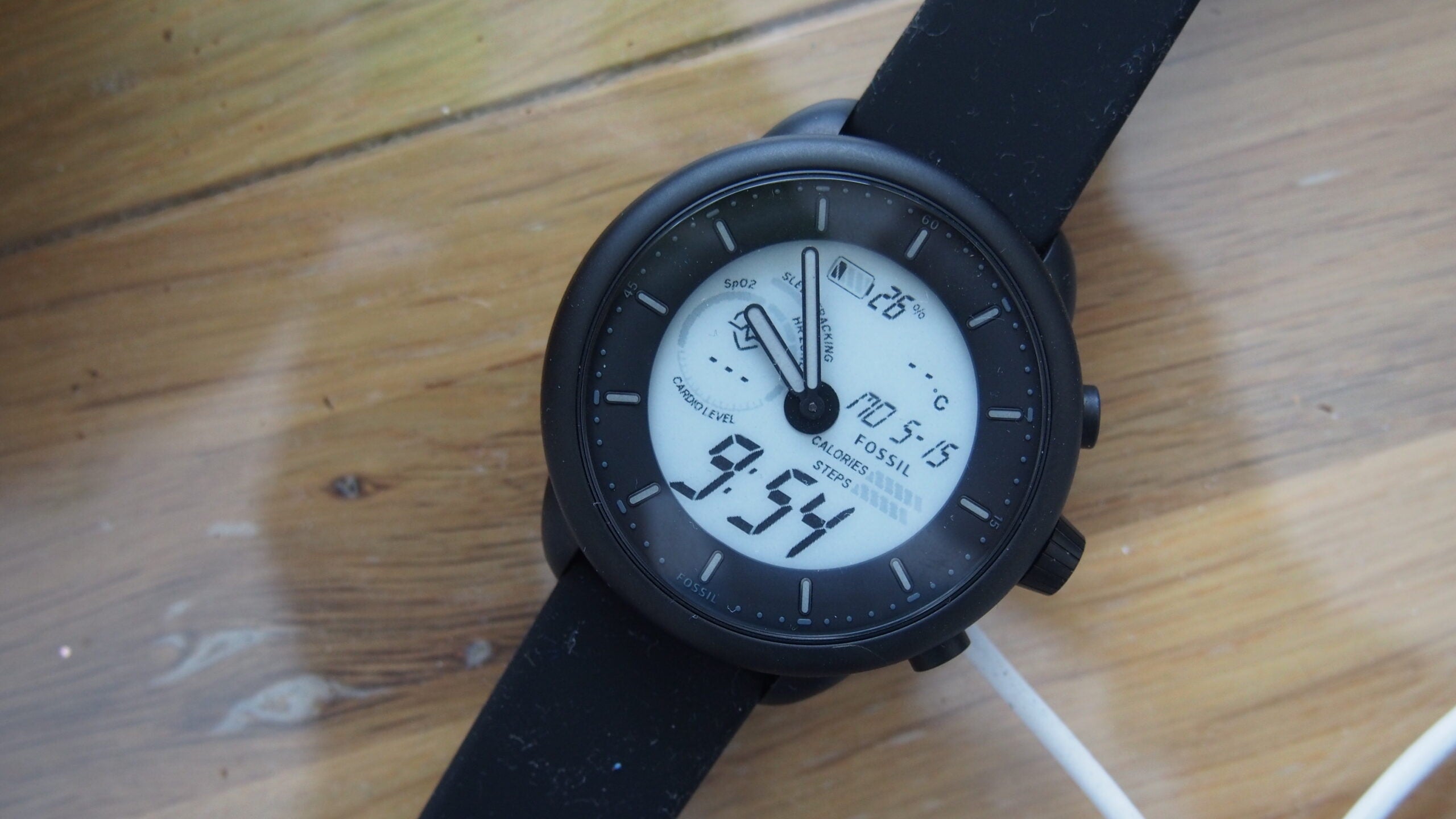Verdict
While the Fossil Gen 6 Wellness edition promises to improve the way you can track your general health and fitness, it still needs to deliver a better core hybrid smartwatch experience to make this worthy of a place on your wrist.
Pros
- Nicely designed watch
- More data packed watch face
- Improved companion app
Cons
- Screen needs to be bigger
- Watch software still feels clunky and slow
- Isn’t fit for swimming or showering
-
Works with Android and iOS:Via the Fossil Smartwatches app -
1.1-inch, E-Ink display:Easy to read outdoors -
Built-in Amazon Alexa:Use voice commands on the go
Introduction
The Fossil Gen 6 Wellness edition is the latest attempt from the fashion watch brand to make a wearable that’s part smartwatch, part traditional timepiece and fully something that you’ll really want to wear.
After debuting its take on the hybrid smartwatch concept with the Hybrid HR in 2020, Fossil launched its Gen 6 Hybrid in 2022 and now it’s offering a Wellness edition of that watch, which bolsters the smarts on offer, including automatic workout tracking and the ability to show off more stats than ever on its E-Ink display.
Fossil’s first hybrid attempt wasn’t a particularly great one, so does the Gen 6 Hybrid Wellness edition show progress for Fossil’s hybrid smartwatch ambitions? Here’s our take.
Design and screen
- Comes in three colours
- 45mm case option only
- 1.1-inch E-ink display
- Not fully waterproof
Like previous Fossil hybrids you do have several case and colour options here. There are three different models in total, including looks for both men and women that are all offered in a single 45mm-sized stainless steel case option. Those are matched up with 20mm, removable straps and you can pick up a nice array of additional official straps if you want to mix up that look. I had the black silicone and matte black case combo to live with, which does feel well made and does feel typically Fossil in looks and build.
Front and centre is a 1.1-inch, E-Ink display that isn’t a touchscreen and is the same-sized screen as the one included on the original Hybrid HR. That E-Ink screen has a set of analogue hands draped across it that move out of the way when you need to interact with the device and view something on the display behind it.
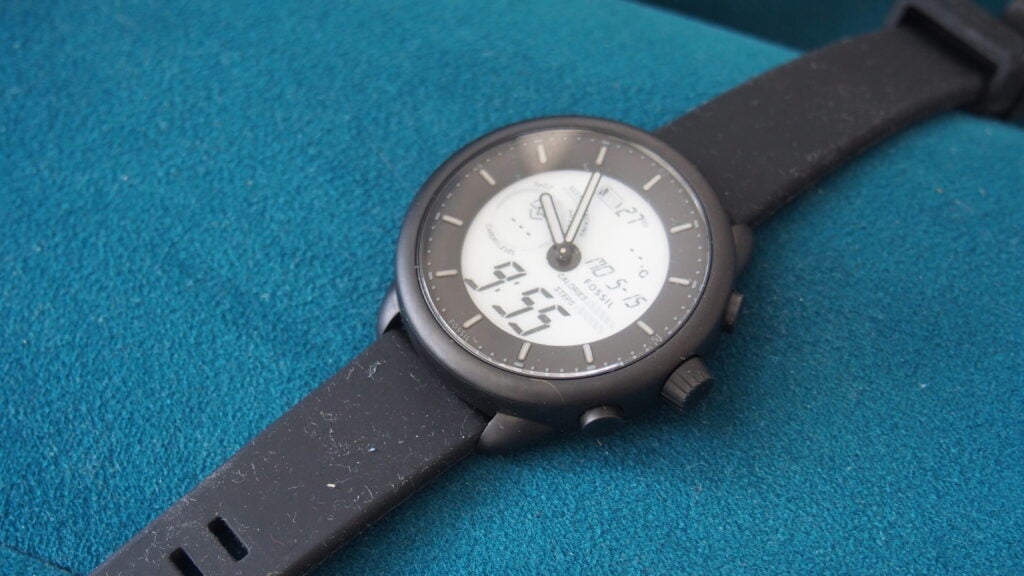
Surrounding that display is quite a sizable bezel, something of which I’d definitely like to see less of and a bit more display instead, which would help to accommodate the increase in stats Fossil does try to squeeze on here.
There’s a few benefits for going for E-Ink over a full colour touchscreen. It’s less of a hog on battery life and offers consistent visibility performance indoors and outdoors, with Fossil also including a backlight that’s activated when you double tap the watch screen.
To control that display, you’ll need to use the crown and the accompanying push buttons, of which you can customise to open and launch different features.
On the durability front, you’re not getting something here that’s fit for showering or swimming. Like Fossil’s previous hybrids it’s got a 3ATM rated design, which means it’s suitable to handle some sweat and light rain, but not much else.
Software and smartwatch features
- Works with Android and iOS
- Amazon Alexa
- View notifications
On paper, the Gen 6 has a pretty impressive array of smartwatch features at its disposal. It might not be Wear OS or Apple Watch-level of smarts, but it should be enough to satisfy most people.
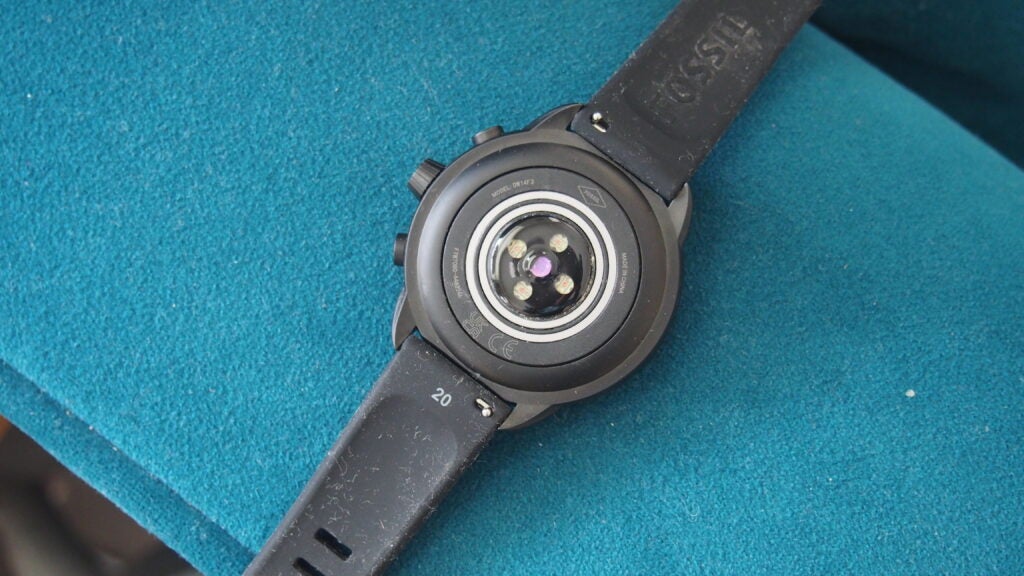
It runs on a proprietary OS as opposed to Google’s Wear OS, and is all set up using the Fossil Smartwatches phone app which thankfully has been given a bit of a clean up.
Unsurprisingly, it’s high on styling and a little lacking in functionality, but on the whole it’s easy to use. Back to the watch itself – I’d say that the software experience hasn’t hugely improved from my previous encounters with Fossil’s hybrids. Unlike hybrid smartwatches of a similar ilk from the likes of Garmin and Withings, the marrying of digital and analogue just doesn’t seem as slick.
Along with the ability to pick and make your own watch faces, Fossil includes a new Wellness face, which crams in more stats like step count progress, a sleep tracking gauge and heart rate is a step in the right direction as far making that watch face more useful. The problem is that everything feels cramped and busy and it’s screaming for a larger screen to let things spread out.
Pressing the main watch crown gets you into the main menu screen, while using the nearby buttons will let you move between different features. The responsiveness of those buttons and the process of moving around the UI can at times, feel a touch slow.
For features like music controls, viewing notifications and weather forecasts, things don’t feel greatly optimised to that E-Ink screen and much like the new watch face, they feel cramped. There’s a microphone on board to enable Amazon Alexa integration, but it will only display responses and it’s hit and miss in terms of picking up those queries on the first attempt or delivering a response at all.
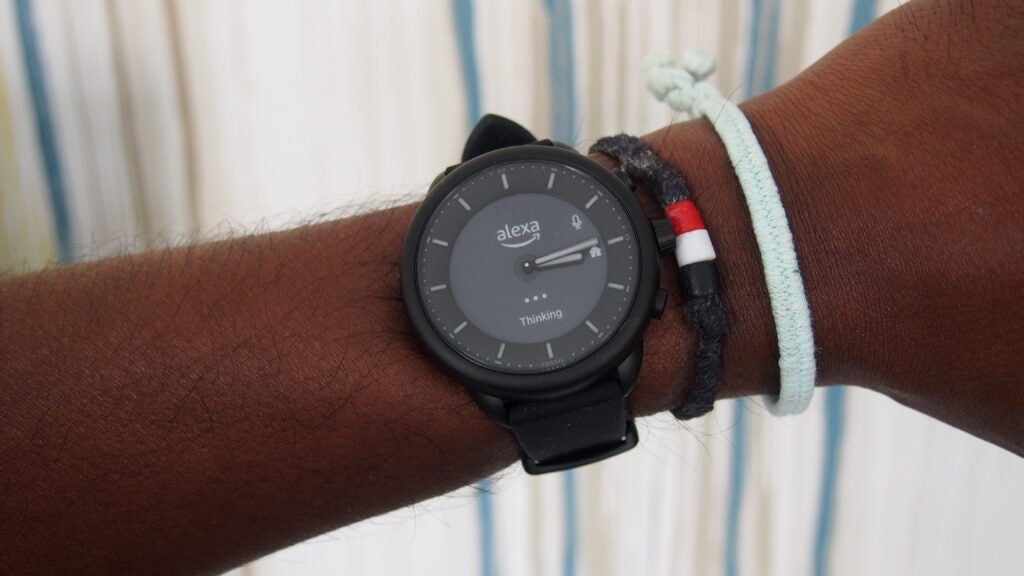
Fossil needs to do a better job of merging those physical buttons into the experience and perhaps integrating a rotating crown to navigate through menus. The screen needs to get bigger too, because even when those analogue hands move out of the way, it’s a bit messy how data is displayed on it.
Fitness tracking
- Heart rate and SpO2 tracking
- Sleep and activity tracking
- Automatic workout tracking
With ‘Wellness’ in its name, Fossil’s Hybrid watch incorporates wellness prominently into its tracking features. There’s an optical sensor in the caseback to track heart rate and SpO2 levels continuously. These are not medically certified features however, so it’s really about giving you a sense of your general wellbeing.
There are sensors onboard to track daily step counts and sleep, and there are workout modes to track activities like running, spinning, hiking and indoor rowing but stops short of adding any sort of GPS, whether built-in or the connected kind that relies on your phone’s GPS. Fossil does add an automatic workout tracking mode to take the thought out of manually tracking that exercise time as well.
The problem I instantly find is that barring the quite crammed new wellness dial to glance at your progress, I found myself looking inside of the companion phone app to see stats for things like step counts or sleep because it’s either vaguely presented or a chore to dig deeper into the menus on the watch itself.
From an accuracy point of view, the daily step counts tended to be around 1,000 steps out of Garmin and the Oura Ring 3’s step tracking, and on some days it reported very low counts. It fared a bit better with resting heart rate data where it generally matched up to the resting HR stats from Garmin, though real-time readings were generally posting higher by as much as 20 bpm. Blood oxygen readings were generally within a few percent of a pulse oximeter and Oura’s tracking, though the data isn’t exactly put to any meaningful use or context.
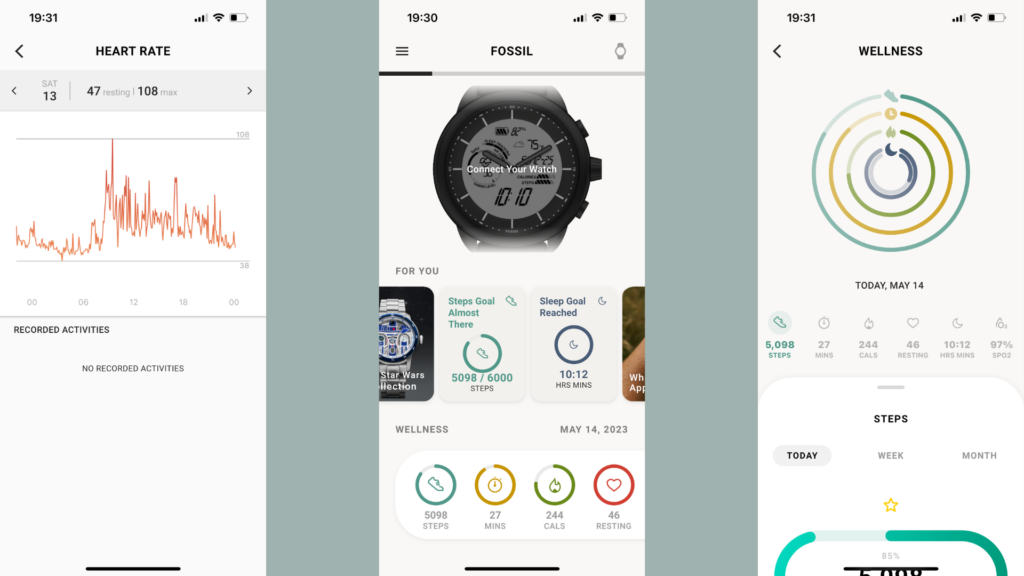
For sleep tracking, Fossil is promising to track sleep duration whilst also breaking down your awake, light and deep sleep stages along with tracking heart rate during sleep as well. Sleep duration in general was largely in line with the sleep duration captured by Oura and Garmin’s sleep tracking. Sleep stage breakdowns were never identical with those other devices but deep and light stages were roughly in the same ballpark.
When it comes to playing sports watch, I’m not sure this is something most will get a lot of use out of. The lack of any GPS support makes the idea of tracking outdoor runs and hikes completely redundant. On a few runs, the distance tracking was off from a Garmin watch and while average heart rate readings were generally consistent with a heart rate monitor chest strap, the maximum readings read high in comparison. Calorie burn estimates in general were pretty low for some pretty intense workouts as well. The other problem is finding out where that tracking data actually lives because I still can’t find where that information is stored, or maybe it simply isn’t stored at all. It’s all very messy.
The automatic workout detection seemed to work well for walks and runs, but it also managed to recognise some clearly non-workout related activities as exercise too, so it’s not faultless.
It’s a better daily activity tracker than a sports watch that’s for sure, but not all data is particularly accurate on that front either. As far as motivating you to move, there’s nothing really beyond some inactivity alerts, and you can find those on trackers that cost considerably less.
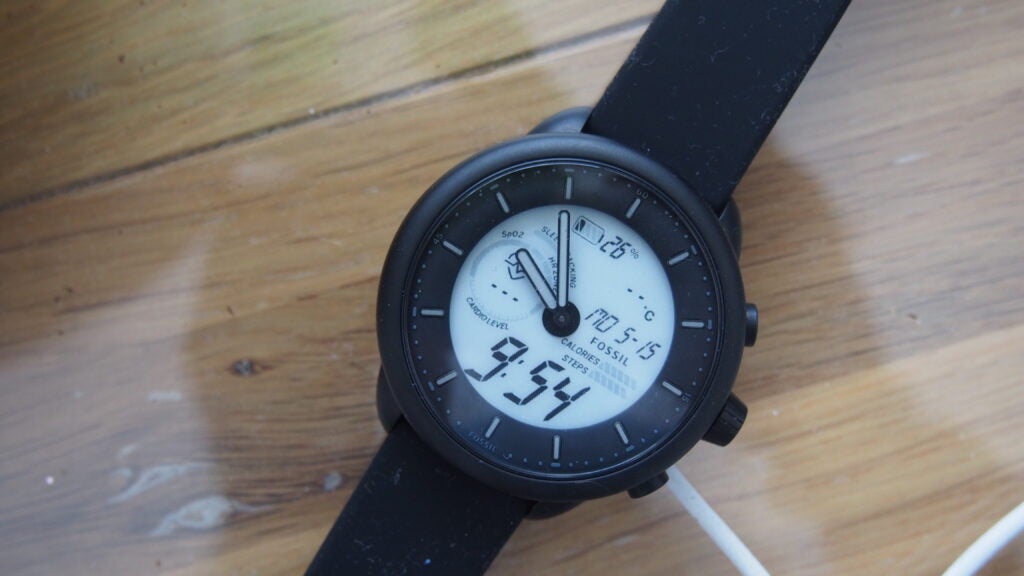
Battery life
- Up to 2 weeks battery life
- Charges up to 80% in 60 minutes
Unlike Fossil’s Wear OS-based smartwatches, its hybrid watches can go for weeks as opposed to days. There’s no power-sapping AMOLED display or big tracking sensors like GPS, and it manages to deliver continuous heart rate and SpO2 tracking without really denting that battery.
Fossil says you can get up to two weeks of battery life, which is the same promise as its previous hybrids. I’d say based on my testing that it can comfortably get through a week and then some. If you’re not using features like workout tracking and receiving regular notifications, then that daily battery drop-off is small and shows its ability to go longer. Without workout tracking, the battery drop off was around 3%. With workout tracking in use for an hour a day, battery drop tended to be 5%.
When the battery does run dry it can charge up reasonably snappily but stops short of offering any sort of fast charging capabilities. An hour spent on its charging cradle will get you from 0-80%, which should be enough to get you through over another week of use.
Latest deals
Should you buy it?
You want a hybrid smartwatch with good fitness tracking features: With the improvements Fossil has made with the watch, the Wellness edition is much more attractive as a fitness tracker. Even if some bits of data aren’t quite up to scratch.
You want the best hybrid smartwatch: Fossil still needs to do a lot of work with the software, growing the screen and the experience in general to make this hybrid smartwatch you really want to live with.
Final Thoughts
I really want the Fossil Gen 6 to be a better hybrid smartwatch because there are things it does get right here. It looks and feels like a nice timepiece, the battery is strong even with continuous monitoring in use and there’s something quite nice about having an E-Ink display as well. Fundamentally though, how it all comes together leaves you scratching your head. Yes, you can now track more, but it needs to get some of the smartwatch basics right first before scaling up on the smarts.
For a more competent hybrid experience, you’d be better suited with the Garmin Vivomove Trend or the Withings ScanWatch.
How we test
We thoroughly test every smartwatch we review. We use industry standard testing to compare features properly and we use the watch as our main device over the review period. We’ll always tell you what we find and we never, ever, accept money to review a product.
Worn as our main tracker during the testing period
Heart rate data compared against dedicated heart rate devices
FAQs
Yes, you can read text messages on the Fossil Gen 6 Hybrid Wellness edition once you’ve enabled the Calls and Messages notifications inside of the Fossil Smartwatches phone app.
Yes, you can change watch faces or dials on the Fossil Gen 6 Hybrid Wellness edition. You can choose a new watch face or create your own from the My Watch section in the Fossil Smartwatches phone app.
Sustainability
TrustedReviews’ holds the fact that global warming is not a myth as a core value and will continuously endeavor to help protect our planet from harm in its business practices.
As part of this mission, whenever we review a product we send the company a series of questions to help us gauge and make transparent the impact the device has on the environment.
We currently haven’t received answers to the questions on this product, but will update this page the moment we do. You can see a detailed breakdown of the questions we ask and why in our sustainability info page.
Jargon buster
BPM
An abbreviation of ‘beats per minute’, used to describe the pace of someone’s heartbeat as recorded by a smartwatch or some other wearable.
SpO2
An abbreviation for determining ‘blood oxygen saturation’, namely the levels of oxygen found within the bloodstream at any given time. A low SpO2 count can be the result of a serious illness.
Verdict
While the Fossil Gen 6 Wellness edition promises to improve the way you can track your general health and fitness, it still needs to deliver a better core hybrid smartwatch experience to make this worthy of a place on your wrist.
Pros
- Nicely designed watch
- More data packed watch face
- Improved companion app
Cons
- Screen needs to be bigger
- Watch software still feels clunky and slow
- Isn’t fit for swimming or showering
-
Works with Android and iOS:Via the Fossil Smartwatches app -
1.1-inch, E-Ink display:Easy to read outdoors -
Built-in Amazon Alexa:Use voice commands on the go
Introduction
The Fossil Gen 6 Wellness edition is the latest attempt from the fashion watch brand to make a wearable that’s part smartwatch, part traditional timepiece and fully something that you’ll really want to wear.
After debuting its take on the hybrid smartwatch concept with the Hybrid HR in 2020, Fossil launched its Gen 6 Hybrid in 2022 and now it’s offering a Wellness edition of that watch, which bolsters the smarts on offer, including automatic workout tracking and the ability to show off more stats than ever on its E-Ink display.
Fossil’s first hybrid attempt wasn’t a particularly great one, so does the Gen 6 Hybrid Wellness edition show progress for Fossil’s hybrid smartwatch ambitions? Here’s our take.
Design and screen
- Comes in three colours
- 45mm case option only
- 1.1-inch E-ink display
- Not fully waterproof
Like previous Fossil hybrids you do have several case and colour options here. There are three different models in total, including looks for both men and women that are all offered in a single 45mm-sized stainless steel case option. Those are matched up with 20mm, removable straps and you can pick up a nice array of additional official straps if you want to mix up that look. I had the black silicone and matte black case combo to live with, which does feel well made and does feel typically Fossil in looks and build.
Front and centre is a 1.1-inch, E-Ink display that isn’t a touchscreen and is the same-sized screen as the one included on the original Hybrid HR. That E-Ink screen has a set of analogue hands draped across it that move out of the way when you need to interact with the device and view something on the display behind it.

Surrounding that display is quite a sizable bezel, something of which I’d definitely like to see less of and a bit more display instead, which would help to accommodate the increase in stats Fossil does try to squeeze on here.
There’s a few benefits for going for E-Ink over a full colour touchscreen. It’s less of a hog on battery life and offers consistent visibility performance indoors and outdoors, with Fossil also including a backlight that’s activated when you double tap the watch screen.
To control that display, you’ll need to use the crown and the accompanying push buttons, of which you can customise to open and launch different features.
On the durability front, you’re not getting something here that’s fit for showering or swimming. Like Fossil’s previous hybrids it’s got a 3ATM rated design, which means it’s suitable to handle some sweat and light rain, but not much else.
Software and smartwatch features
- Works with Android and iOS
- Amazon Alexa
- View notifications
On paper, the Gen 6 has a pretty impressive array of smartwatch features at its disposal. It might not be Wear OS or Apple Watch-level of smarts, but it should be enough to satisfy most people.

It runs on a proprietary OS as opposed to Google’s Wear OS, and is all set up using the Fossil Smartwatches phone app which thankfully has been given a bit of a clean up.
Unsurprisingly, it’s high on styling and a little lacking in functionality, but on the whole it’s easy to use. Back to the watch itself – I’d say that the software experience hasn’t hugely improved from my previous encounters with Fossil’s hybrids. Unlike hybrid smartwatches of a similar ilk from the likes of Garmin and Withings, the marrying of digital and analogue just doesn’t seem as slick.
Along with the ability to pick and make your own watch faces, Fossil includes a new Wellness face, which crams in more stats like step count progress, a sleep tracking gauge and heart rate is a step in the right direction as far making that watch face more useful. The problem is that everything feels cramped and busy and it’s screaming for a larger screen to let things spread out.
Pressing the main watch crown gets you into the main menu screen, while using the nearby buttons will let you move between different features. The responsiveness of those buttons and the process of moving around the UI can at times, feel a touch slow.
For features like music controls, viewing notifications and weather forecasts, things don’t feel greatly optimised to that E-Ink screen and much like the new watch face, they feel cramped. There’s a microphone on board to enable Amazon Alexa integration, but it will only display responses and it’s hit and miss in terms of picking up those queries on the first attempt or delivering a response at all.

Fossil needs to do a better job of merging those physical buttons into the experience and perhaps integrating a rotating crown to navigate through menus. The screen needs to get bigger too, because even when those analogue hands move out of the way, it’s a bit messy how data is displayed on it.
Fitness tracking
- Heart rate and SpO2 tracking
- Sleep and activity tracking
- Automatic workout tracking
With ‘Wellness’ in its name, Fossil’s Hybrid watch incorporates wellness prominently into its tracking features. There’s an optical sensor in the caseback to track heart rate and SpO2 levels continuously. These are not medically certified features however, so it’s really about giving you a sense of your general wellbeing.
There are sensors onboard to track daily step counts and sleep, and there are workout modes to track activities like running, spinning, hiking and indoor rowing but stops short of adding any sort of GPS, whether built-in or the connected kind that relies on your phone’s GPS. Fossil does add an automatic workout tracking mode to take the thought out of manually tracking that exercise time as well.
The problem I instantly find is that barring the quite crammed new wellness dial to glance at your progress, I found myself looking inside of the companion phone app to see stats for things like step counts or sleep because it’s either vaguely presented or a chore to dig deeper into the menus on the watch itself.
From an accuracy point of view, the daily step counts tended to be around 1,000 steps out of Garmin and the Oura Ring 3’s step tracking, and on some days it reported very low counts. It fared a bit better with resting heart rate data where it generally matched up to the resting HR stats from Garmin, though real-time readings were generally posting higher by as much as 20 bpm. Blood oxygen readings were generally within a few percent of a pulse oximeter and Oura’s tracking, though the data isn’t exactly put to any meaningful use or context.

For sleep tracking, Fossil is promising to track sleep duration whilst also breaking down your awake, light and deep sleep stages along with tracking heart rate during sleep as well. Sleep duration in general was largely in line with the sleep duration captured by Oura and Garmin’s sleep tracking. Sleep stage breakdowns were never identical with those other devices but deep and light stages were roughly in the same ballpark.
When it comes to playing sports watch, I’m not sure this is something most will get a lot of use out of. The lack of any GPS support makes the idea of tracking outdoor runs and hikes completely redundant. On a few runs, the distance tracking was off from a Garmin watch and while average heart rate readings were generally consistent with a heart rate monitor chest strap, the maximum readings read high in comparison. Calorie burn estimates in general were pretty low for some pretty intense workouts as well. The other problem is finding out where that tracking data actually lives because I still can’t find where that information is stored, or maybe it simply isn’t stored at all. It’s all very messy.
The automatic workout detection seemed to work well for walks and runs, but it also managed to recognise some clearly non-workout related activities as exercise too, so it’s not faultless.
It’s a better daily activity tracker than a sports watch that’s for sure, but not all data is particularly accurate on that front either. As far as motivating you to move, there’s nothing really beyond some inactivity alerts, and you can find those on trackers that cost considerably less.

Battery life
- Up to 2 weeks battery life
- Charges up to 80% in 60 minutes
Unlike Fossil’s Wear OS-based smartwatches, its hybrid watches can go for weeks as opposed to days. There’s no power-sapping AMOLED display or big tracking sensors like GPS, and it manages to deliver continuous heart rate and SpO2 tracking without really denting that battery.
Fossil says you can get up to two weeks of battery life, which is the same promise as its previous hybrids. I’d say based on my testing that it can comfortably get through a week and then some. If you’re not using features like workout tracking and receiving regular notifications, then that daily battery drop-off is small and shows its ability to go longer. Without workout tracking, the battery drop off was around 3%. With workout tracking in use for an hour a day, battery drop tended to be 5%.
When the battery does run dry it can charge up reasonably snappily but stops short of offering any sort of fast charging capabilities. An hour spent on its charging cradle will get you from 0-80%, which should be enough to get you through over another week of use.
Latest deals
Should you buy it?
You want a hybrid smartwatch with good fitness tracking features: With the improvements Fossil has made with the watch, the Wellness edition is much more attractive as a fitness tracker. Even if some bits of data aren’t quite up to scratch.
You want the best hybrid smartwatch: Fossil still needs to do a lot of work with the software, growing the screen and the experience in general to make this hybrid smartwatch you really want to live with.
Final Thoughts
I really want the Fossil Gen 6 to be a better hybrid smartwatch because there are things it does get right here. It looks and feels like a nice timepiece, the battery is strong even with continuous monitoring in use and there’s something quite nice about having an E-Ink display as well. Fundamentally though, how it all comes together leaves you scratching your head. Yes, you can now track more, but it needs to get some of the smartwatch basics right first before scaling up on the smarts.
For a more competent hybrid experience, you’d be better suited with the Garmin Vivomove Trend or the Withings ScanWatch.
How we test
We thoroughly test every smartwatch we review. We use industry standard testing to compare features properly and we use the watch as our main device over the review period. We’ll always tell you what we find and we never, ever, accept money to review a product.
Worn as our main tracker during the testing period
Heart rate data compared against dedicated heart rate devices
FAQs
Yes, you can read text messages on the Fossil Gen 6 Hybrid Wellness edition once you’ve enabled the Calls and Messages notifications inside of the Fossil Smartwatches phone app.
Yes, you can change watch faces or dials on the Fossil Gen 6 Hybrid Wellness edition. You can choose a new watch face or create your own from the My Watch section in the Fossil Smartwatches phone app.
Sustainability
TrustedReviews’ holds the fact that global warming is not a myth as a core value and will continuously endeavor to help protect our planet from harm in its business practices.
As part of this mission, whenever we review a product we send the company a series of questions to help us gauge and make transparent the impact the device has on the environment.
We currently haven’t received answers to the questions on this product, but will update this page the moment we do. You can see a detailed breakdown of the questions we ask and why in our sustainability info page.
Jargon buster
BPM
An abbreviation of ‘beats per minute’, used to describe the pace of someone’s heartbeat as recorded by a smartwatch or some other wearable.
SpO2
An abbreviation for determining ‘blood oxygen saturation’, namely the levels of oxygen found within the bloodstream at any given time. A low SpO2 count can be the result of a serious illness.

















